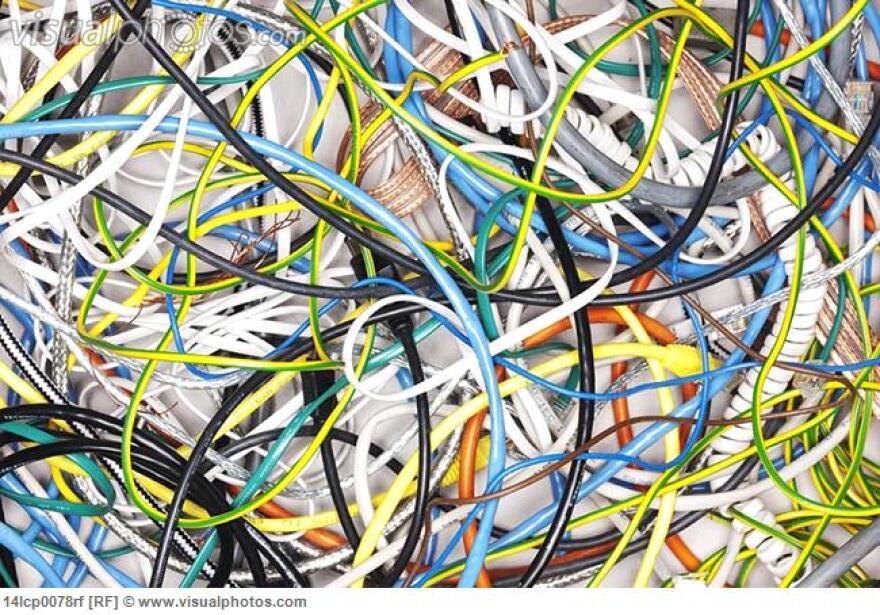One of my favorite scenes from the sci-fi movie The Matrix Reloaded, is when the protagonist, Neo, accompanies CouncillorHamann down into the engineering level of Zion, the underground city where members of the last remaining human society are hiding out from the machines seeking to destroy them.
“I like it down here,” Councillor Hamann exclaims as they look out over the cavernous room filled with humming machines providing potable water, breathable air, and consistent power to the inhabitants of Zion. “I like to be reminded that this city survives because of these machines. These machines are keeping us alive while other machines are coming to kill us. Interesting, isn’t it?”
Yes, it is interesting. Here, inside our own Matrix that we call “Earth,” we too have built a world in which we need machines to survive. Without them, the world as we know it—the industrialized world we’ve constructed—ceases to exist.
Without our machines, we turn out the lights, turn off the heat, and turn the clocks back to at least the Middle Ages, perhaps further. In fact, we get rid of our clocks altogether. In no time, our cities crumble without the machines required to maintain them. Weeds invade and unmaintained pavement pops and buckles. Gas lines and power plants explode. Sewer systems overflow and water mains burst. Dams burst too. Buildings topple and entire cities are swept away by a torrent of torturous water.
But flooded cities are the least of our worries in a world without the machines needed to maintain them. Without our machines, millions of us die because we simply cannot grow enough food to feed everyone. And the food that we do manage to grow without the aid of our machines cannot be transported to the people who need it and they, in turn, cannot transport themselves quickly enough to the places where the food is grown and starve to death. Food rots in the fields while corpses rot on the plains. Meanwhile, millions of others die from disease because we can no longer make simple medicines such as penicillin.
Without our machines, the majority of us die; we literally drop like flies.
We need our machines to survive and although we don’t have autonomous, “artificially intelligent” machines that are hell-bent on killing us, we yearly slaughter fellow members of the human race with the machines of war that we’ve cleverly created for the express purpose of doing so. Interesting, isn’t it?
In a short time—about 100,000 years—human culture has quickly evolved from a simple tool-making culture, to agrarian, to industrial, to wholly machine-dependant. While our evolution has been meteoric, it’s just a single tick on the geological time-scale and not even a blip on the radar of our solar system’s 4.5-billion-year existence.
And the engine of change humming beneath our rapid evolution has been technology.
“We humans have linked our destinies with our machines. Our technology has gotten so complex that we no longer can understand or fully control it. We have entered the Age of Entanglement,” wrote inventor and scientist Danny Hillis in Scientific American.
According to Hillis, the Internet is a case in point. “Most people may not realize that they depend on the Internet when they place a telephone call or fly on an airplane. In our intertwined world, it is increasingly difficult to understand the very systems we have built or how to repair them.”
There is no blueprint to the system of the modern world. It is the sum of its evolved parts. And while some die-hard conspiracy theorists may take a somewhat masochistic comfort in believing that the world is under the control of the shadowy Illuminati, it is not controlled by men or gods. Just like the rest of the universe, the modern world is controlled by the fundamental laws of nature from which all technology is created.
In the end, all technologies are the harnessing and exploitation of natural phenomena in order to fulfill a human purpose or need. Technology can only leverage that which already exists in nature: there was computation before there were computers, light before there were light bulbs, and heat before there were heat pumps.
“Technology builds out not just from combination of what exists already but from the constant capturing and harnessing of natural phenomena,” wrote Arthur W. Brian in his brilliant book The Nature of Technology: What It Is and How It Evolves.
While I agree with Hillis in principle, I disagree in particular. It’s not that we’ve “linked” our destiny with technology or the resulting machines that come out of technological progress. It’s not that we’ve “entered” the “Age of Entanglement”. It’s that we never made a choice. Human destiny has always been entangled with technology because without it, we would have never evolved to Homo sapiens in the first place.
Or to put it another way: Man is not uniquely human without technology. Take away technology and Man is evolutionarily something different. Without technology, without our ability to harness natural phenomena and use it to our benefit, we most likely would have ceased to evolve and perished from the Earth long ago just like many other species. Technology is what made us different. It’s what makes us different. It’s why we’re still here.
And that is the path we are still on in the “Age of Entanglement” in which human culture becomes increasingly complex and entangled with its technology to the point of no return—a point that, for better or for worse, we passed long ago.
We’re entangled with our technology and it can be no other way. It is an entangled web that Man weaves, but it is the only web we have to capture our future.
Interesting, isn’t it?
Scott Dewing is a technologist, teacher, and writer. He lives with his family on a low-tech farm in the State of Jefferson. Archives of his columns and other postings can be found on his blog at: blog.insidethebox.org




